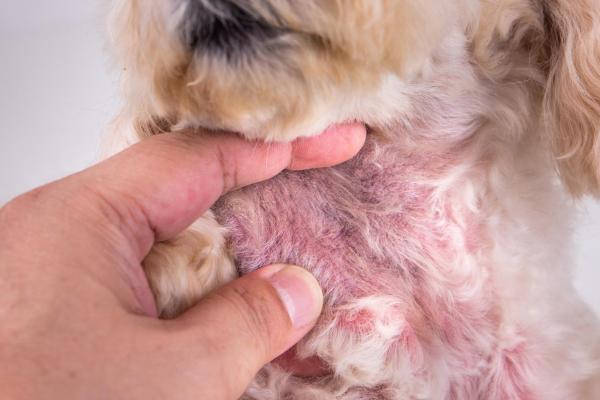What to Expect After Deworming a Dog



See files for Dogs
In most cases, all you need to expect after deworming your dog is that they won't get parasites. Worms are types of internal parasites which often cause gastrointestinal upset, but some of them can be fatal. This is the case with heartworms, lungworms and others which infest vital tissues of the body. Although deworming agents are important preventive medications prescribed by a veterinarian, side effects can occur on rare occasions. While the risk-benefit ratio of deworming drugs are very in favor of the benefits, every medication has the potential for adverse effects in the right circumstances.
At AnimalWised, we look at 7 common side effects of antiparasitic drugs by discovering what to expect when deworming a dog.
How long does dewormer take to work?
A deworming agent is a type of antiparasitic drug which is used to kill various types of worm which are considered internal parasites in dogs. It is used in one of two ways, either as a preventive or therapeutic drug:
- Preventive: various types of parasites are more prevalent in certain areas. Preventive deworming tablets are given to ensure the dog has protection from an infestation. Which drug is used will be determined by the veterinarian as it will change according to geographic region and other factors.
- Therapeutic: when a dog has an infestation of worms, deworming drugs will be given to treat the infestation. Different drugs will work in different ways, depending on the type of parasite which has infested the dog.
How long it takes for the dewormer to work will depend on the individual dog. Your veterinarian will help to guide the treatment and form a prognosis. They will consider the following when doing so:
- Health of the dog: if the dog is of robust health, their immune system is stronger and the dewormer should act more efficiently. If the dog has a weakened immune system and is of poor health, it is likely their organism will take longer to recover.
- Level of infestation: a dog can be parasitized by worms and be symptomatic, i.e. they do not show any obvious symptoms. This is often the case when the infestation is not severe. In other cases, the dog may be riddled with worms and their organism becomes consequently very weak. In the latter case, it may take longer for the dewormer to show its efficacy.
- Type of parasite: some dewormers may be used to treat various types of worms, but this does not mean they will all respond equally. The parasite may also be in different stages of their life cycle, another factor which needs to be considered when determining how long it takes for a dewormer to work.
Different dewormers will take different times to show their effects. You can ask your veterinarian about which dewormer is being used and how long you can expect it to take effect in your dog.
Diarrhea
The most common type of worms in puppies are intestinal worms. Once the medication is administered and the worms die, they fill up the intestines and are flushed out by the body with excess fluid. The feces of dogs after deworming may be softer or have small white spots indicating excreted internal parasites. These drugs can cause such side effects by irritating the gastrointestinal mucosa and hypersensitivity.
In most cases, we do not expect diarrhea after deworming. If they do occur they are usually mild and do not require treatment. However, if it is severe or persistent over an extended period of time, it is important to consult a veterinarian to initiate appropriate treatment and avoid dehydrating the dog. Likewise, it is essential to notify the veterinarian who prescribed the medication if vomiting or diarrhea is accompanied by blood.
If you want to know more about diarrhea after deworming, in this other article, we talk about the usual duration of diarrhea after deworming a dog.
Vomiting
Due to some medications contained in deworming tablets, you may expect your dog may suffer from nausea immediately after the pill is administered. This is often because it reacts with your dog's stomach acid. They may whine to get rid of the pill.
Even if the pills are not administered in tablet form, your dog may still feel nauseous for some time after the medication is administered. This is because the drug causes the worms to release toxins when they die. The body reacts to this and excretes them through vomiting. Make sure your dog has access to clean, fresh water to replace lost fluids they excrete through vomiting.
If symptoms persist for more than a day, be sure to visit your trusted veterinarian, because in some cases it may be necessary to intervene to prevent dehydration. In this other article, we talk about how you can treat vomiting in dogs.
Intestinal obstruction
When dogs are heavily infested with gastrointestinal parasites, antiparasitic treatment can lead to intestinal obstruction. This is caused the sudden death of a large number of parasites at the same time. Their dead bodies collect to form the obstruction.
The risk of intestinal obstruction is greater when administering antiparasitic drugs such as Pyrantel or Praziquantel, sold under the brand name Biltricide, as these drugs cause the worms to die by making them rigid or spastically paralyzed. Since the worms are completely rigid, they are difficult to excrete and intestinal obstruction can occur.
For this reason, when large parasites are present, it is recommended that they be treated with drugs that cause flaccid paralysis, such as macrocyclic lactones (avermectins and milbemycins). Obstruction may also be more likely to occur in small dogs with high parasite infestations.
You can learn more about what parasites can affect dogs in this other article, where we also discuss the most common methods of deworming dogs and how you can use those methods to prevent and treat parasites.
Allergic reactions
Both the active ingredients and the excipients that accompany them can cause allergic or hypersensitive reactions in some dogs, regardless of the route by which they are administered. Signs that may accompany these allergic reactions include:
- Edema
- Facial swelling
- Drooling
- Itching
- Urticaria
- Anaphylaxis
If you notice any of these symptoms, suspend the treatment and seek veterinary care immediately. For most localized allergic reactions, it is usually sufficient to treat the symptoms on an outpatient basis, that is, the dog will not have to spend the night at the veterinary clinic. Anaphylaxis can, however, be fatal, so it is important in this case to take immediate action and initiate hospital treatment.
It is worth mentioning that these allergic reactions can also occur in dog handlers when they administer these drugs to their dogs. People with sensitive skin or known allergies to medications should handle these products with caution and wear gloves.
If you want to learn more about allergies in dogs and their treatment, do not miss this other article where we discuss which allergy medications are safe for dogs.
Local reactions
Antiparasitic medications administered parenterally (by injection) or topically (by pipettes, collars, etc.) could cause local reactions at the site of inoculation or administration. Some of the most common reactions are:
- Redness of the skin
- Alopecia
- Itching
- Pain
Typically, these reactions are mild and resolve on their own or may only require symptomatic relief of itching or discomfort. However, as mentioned earlier, you should always discontinue treatment and see your veterinarian if symptoms persist for more than a day.

Neurological reactions
Although much less common, antiparasitics can also cause neurotoxic effects leading to the appearance of neurological symptoms, such as:
- Pupil dilation or contraction
- Depression or lethargy
- Difficulty coordinating movements
- Tremors
- Seizures
At the occurrence of these adverse reactions after deworming a dog, you must urgently consult a veterinarian. A neurological examination of the dog must be performed, and appropriate treatment will be determined in each case.
It is essential to identify neurological problems as soon as possible. That way, we can get them to the vet so that an appropriate diagnosis can be made, and a treatment plan put in place. Continue reading in this other AnimalWised article, where we present the main symptoms of neurological disorders in dogs.
Side effects during pregnancy or lactation
There are antiparasitic drugs that are able to cross the placental barrier and cause embryotoxic, teratogenic, or mutagenic effects in embryos or fetuses. Similarly, there are drugs that are excreted through the milk and can be toxic to nursing puppies.
Therefore, only antiparasitic drugs that have been shown to be safe in pregnant or lactating dogs should be used during pregnancy and lactation. As long as the safety of the drug is not established during pregnancy, it should only be used in accordance with a benefit-risk assessment by a veterinarian.
If you want to learn more about deworming in lactating or pregnant dogs, do not miss this other article about deworming my pregnant dog.

Other reactions after deworming a dog
In this article we have mentioned what to expect with the most common side effects after deworming a dog. However, in some very rare cases, these drugs can be toxic and cause the following diseases:
- Cardiotoxicity (damage to the heart muscle)
- Hepatotoxicity (damage to the liver)
- Nephrotoxicity (damage to the kidneys)
Whenever we administer a medication to our dog, it is important to monitor the possible occurrence of side effects. Whether they are mild or severe, they should be reported to the veterinarian who prescribed the medication, who will decide if treatment is needed.
In the event of a deworming drug overdose in dogs, it is critical to see a veterinarian as soon as possible. In these cases, the same effects as described may occur, but with greater intensity and speed. Although side effects are a real problem when taking dewormers, they are usually short-lived and extreme reactions are rare.
Veterinarians advise, despite the possible side effects, that dewormers are still the best prevention and solution for treating worms in puppies and adult dogs. They are regulated and scientifically tested to ensure their safety.
If you want to learn more about the benefits and importance of deworming your dog, read this other article about the importance of deworming.
This article is purely informative. AnimalWised does not have the authority to prescribe any veterinary treatment or create a diagnosis. We invite you to take your pet to the veterinarian if they are suffering from any condition or pain.
If you want to read similar articles to What to Expect After Deworming a Dog, we recommend you visit our De-worming category.






